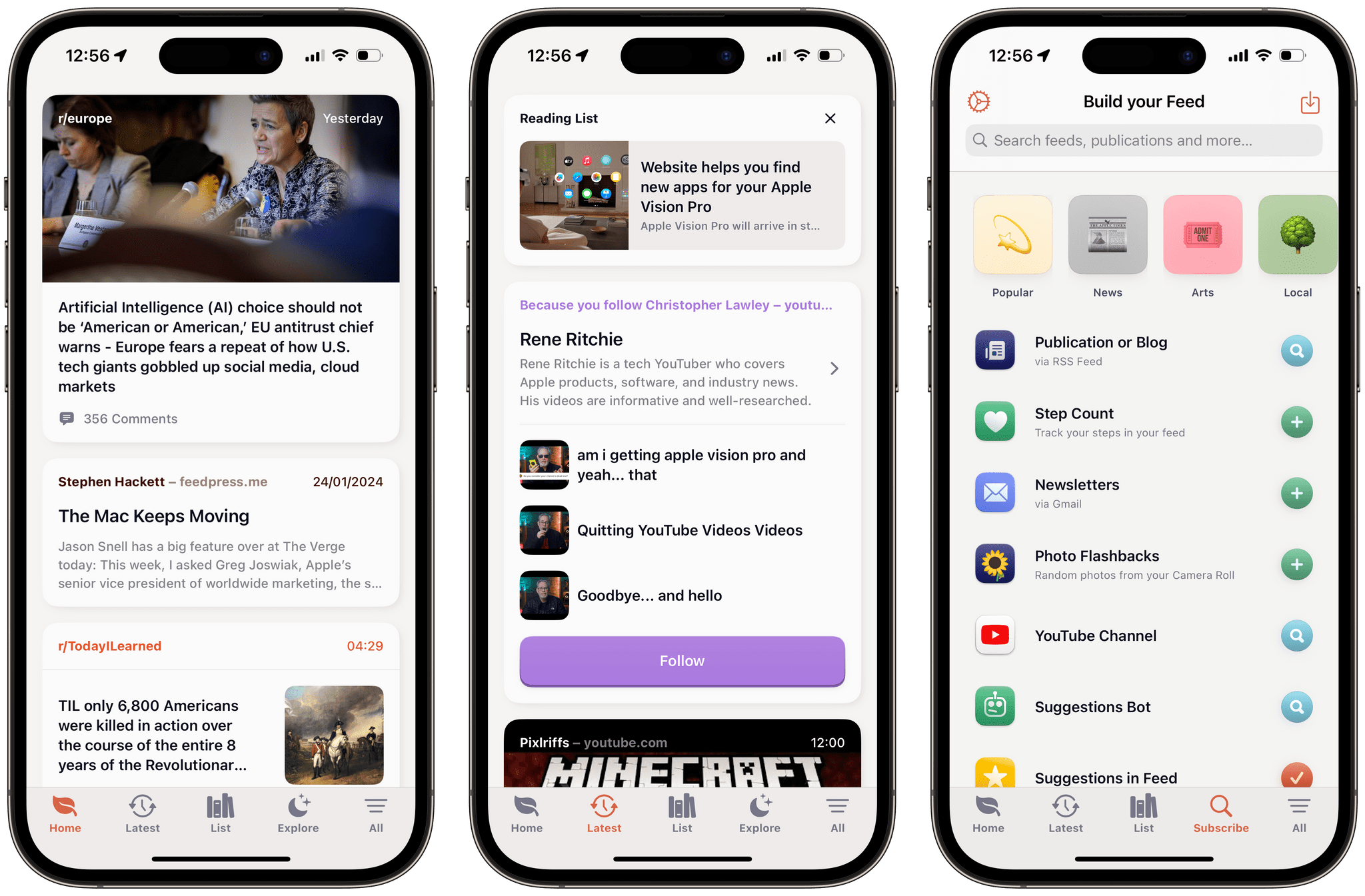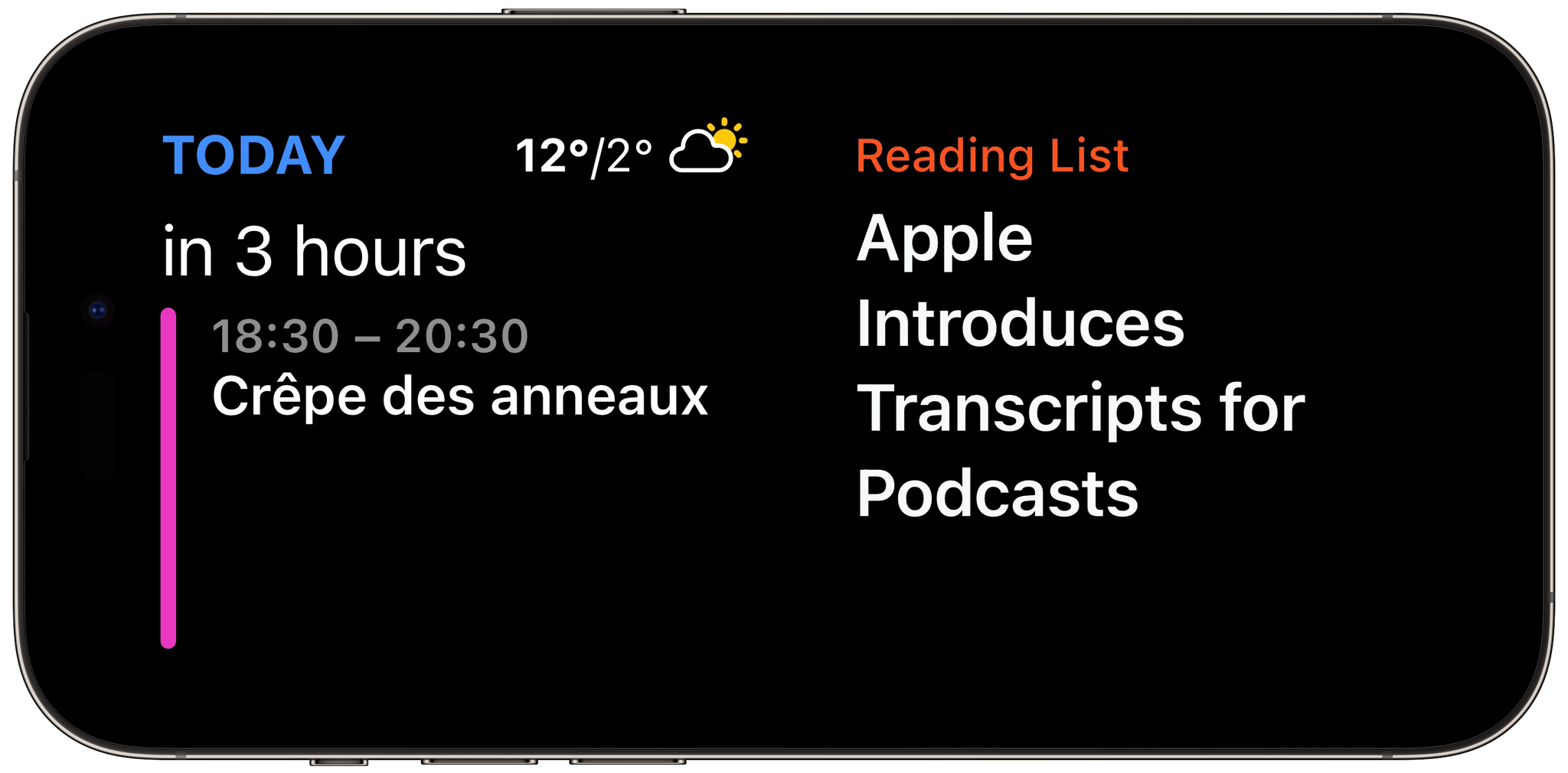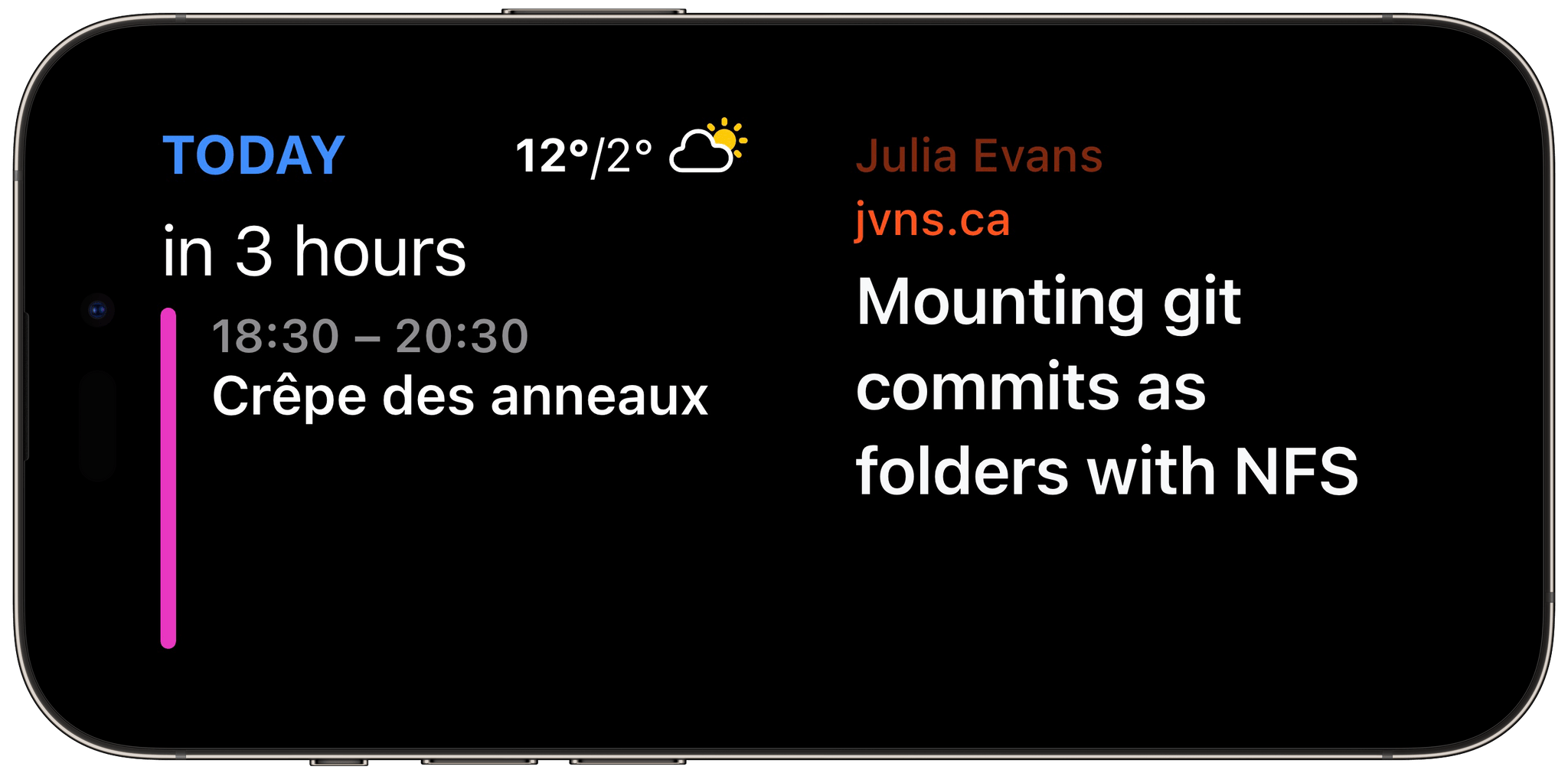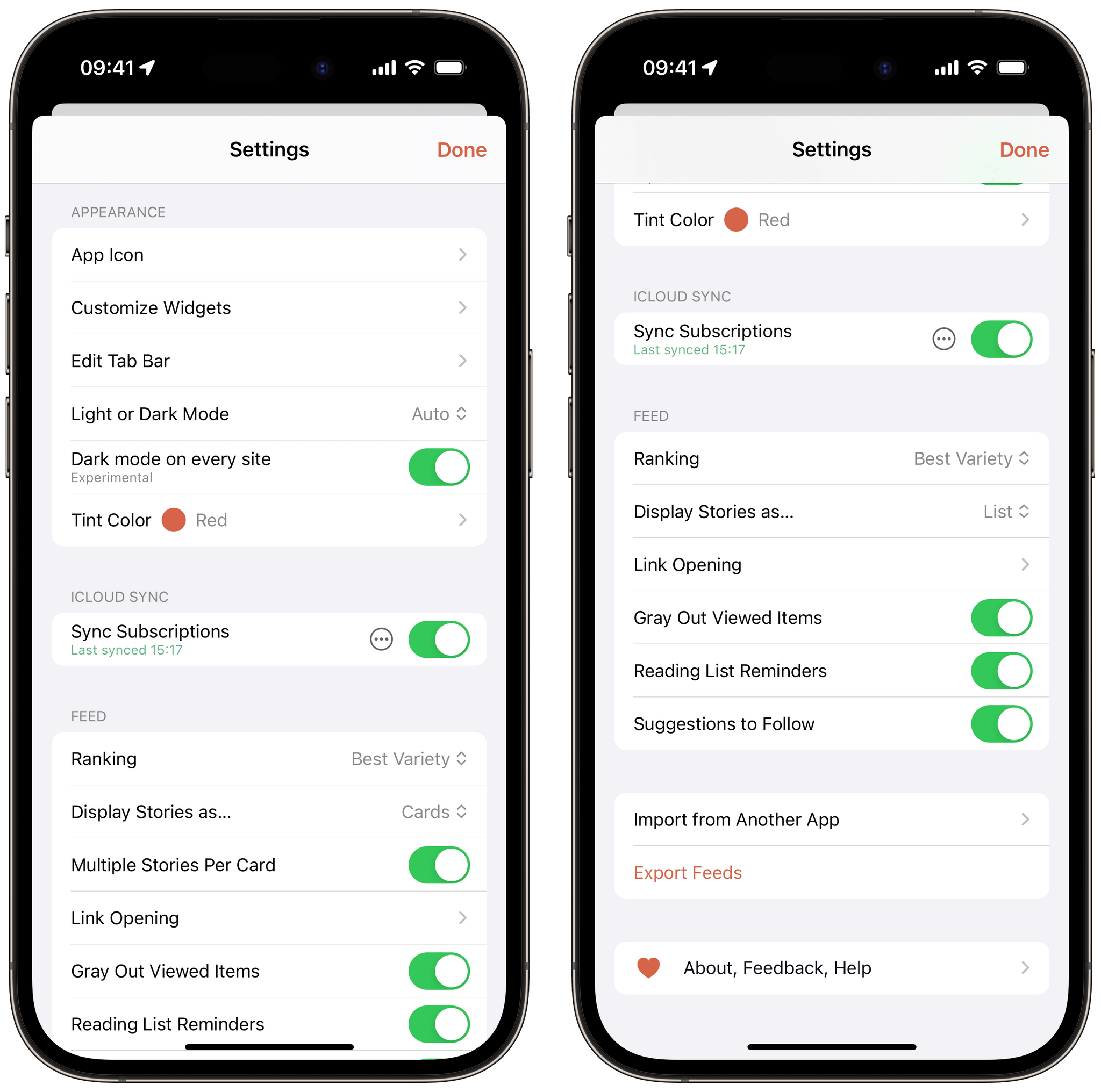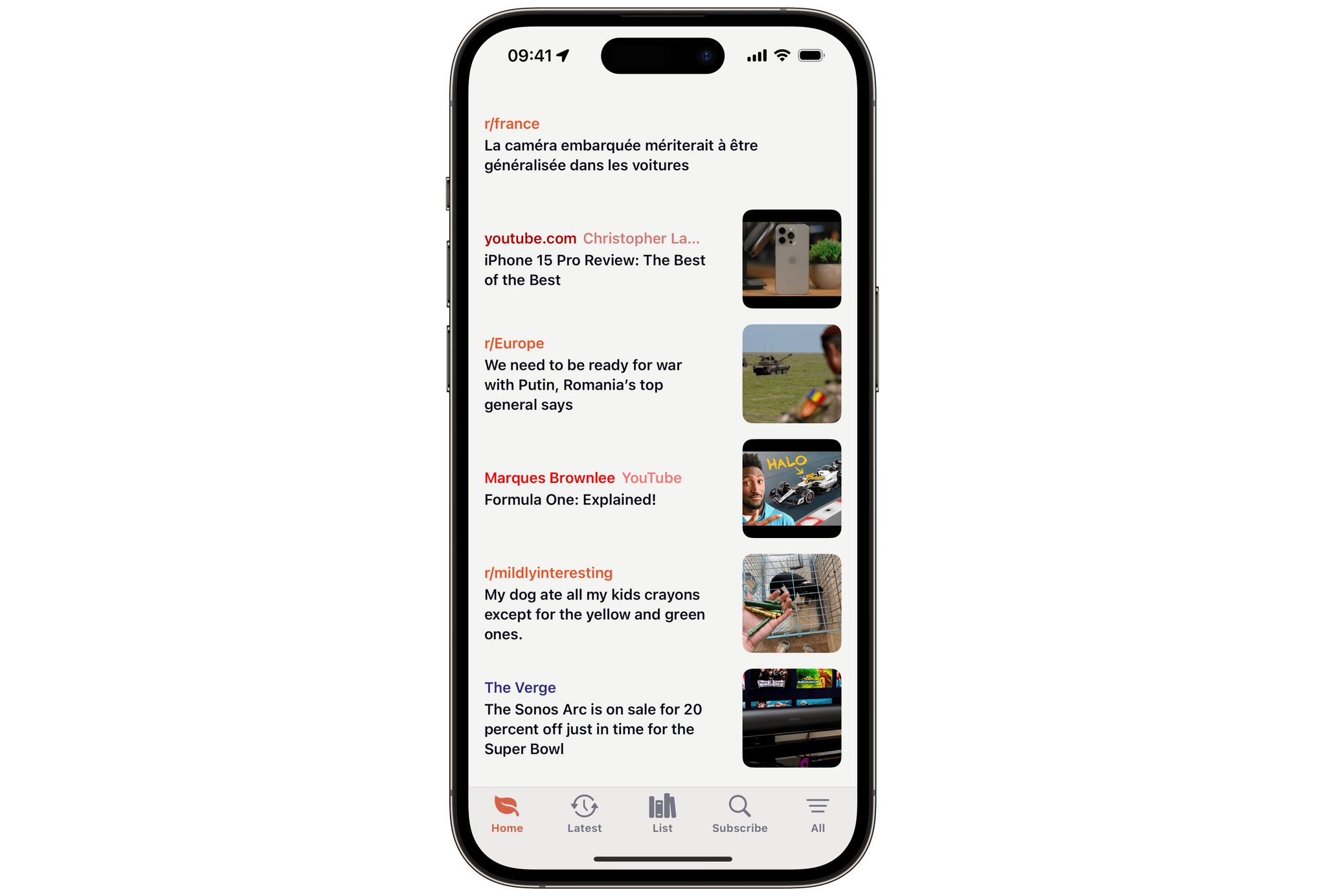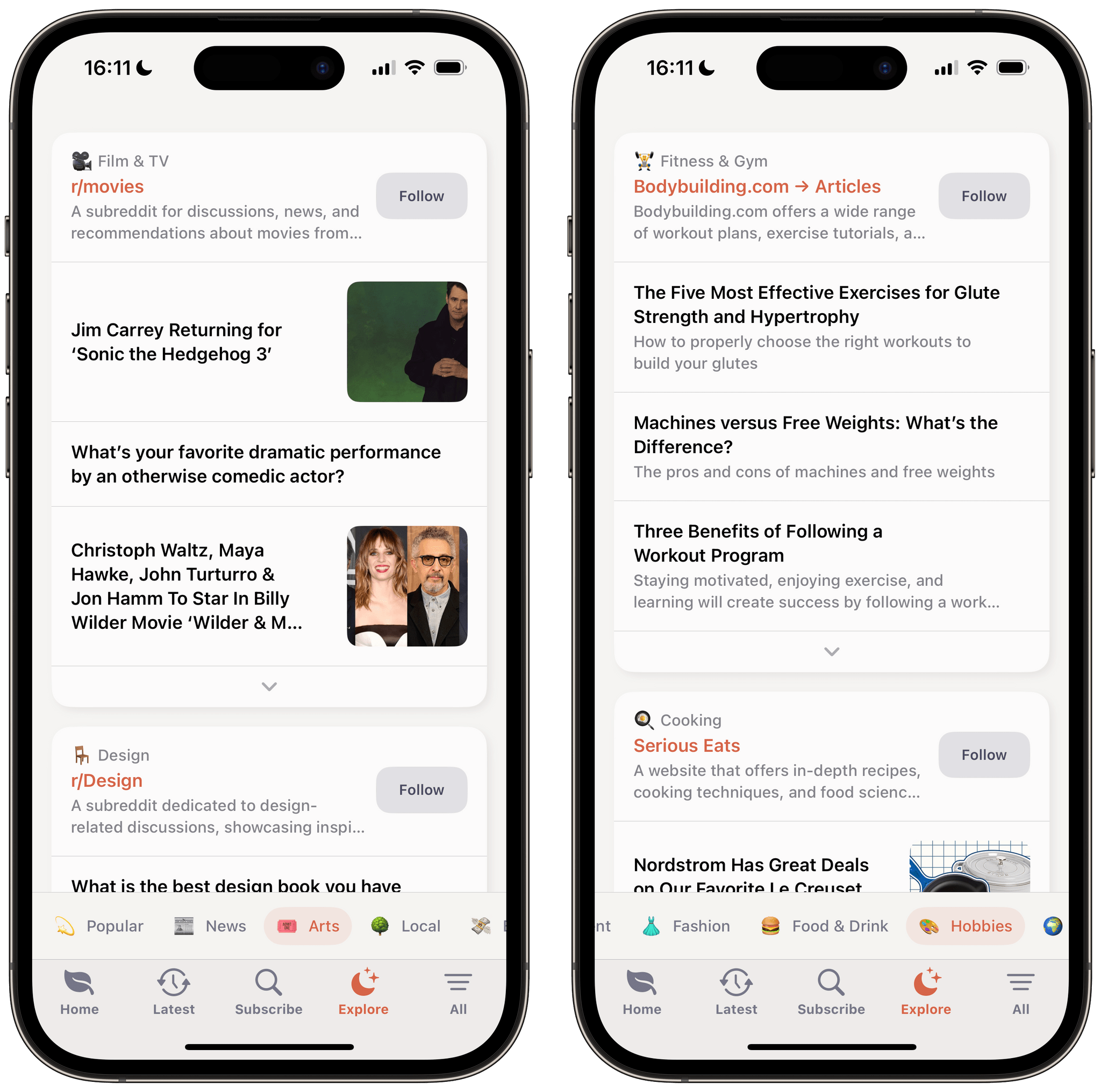With The Iconfactory launching Project Tapestry this week, I was reminded of an indie app that I first started testing a few months ago. feeeed – that’s with four ‘e’s – by Nate Parrott is a feed reader app unlike any other I’ve seen on iOS.
Today, with our favorite content scattered across social media platforms, apps, blogs, and newsletters, it’s honestly really hard to keep up, and there is clearly a demand for an app that could juggle with all of them. feeeed is an attempt at embracing that diversity, and letting you build your own feed, merging all those sources into one continuous and beautifully designed stream.
I was excited about this app when it originally came out, and for the past week, I have once again given it a prime spot on my iPhone Home Screen to properly try it out as my main reading app.
Let’s jump in.
When you first start using feeeed, one thing is immediately clear: the variety of sources you can combine in this app is immense. You can of course subscribe to any RSS feeds — the app lets you import an OPML file from other RSS reader apps — but you can also subscribe to a wide variety of different sources, including but not limited to: newsletters via Gmail, subreddits, YouTube channels, Twitter and Mastodon profiles, Hacker News, Tumblr blogs, TikTok accounts, and more.
A special mention goes to my absolute favorite custom integration in feeeed, which is the ability to select a part of a website to show up in your feed. You can select any area on any webpage, and that area will regularly show up in the Home tab of the app. It’s perfect for staying up to date on big news headlines, or more obscure websites that don’t offer RSS feeds.
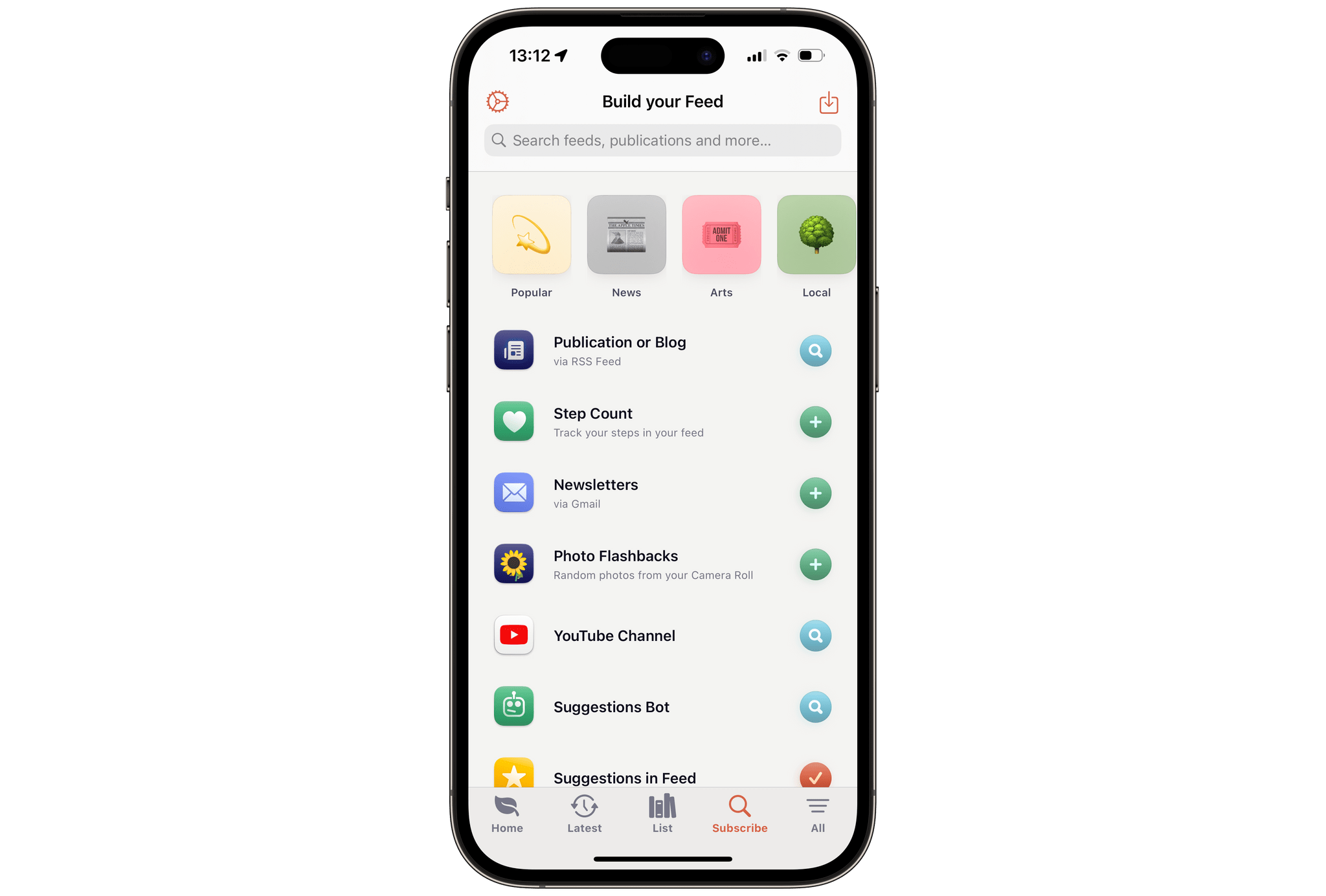
The Subscribe tab in feeeed lets you browse through popular sources to build your feed, as well as add a variety of custom sources.
But it doesn’t stop there. Nate Parrott went pretty far to make it possible to turn feeeed into a very personal stream of content and data. In feeeed, in you can opt in to have photos from your photo library show up occasionally, as well as daily Step Count updates, and personal reminders.
While I doubt I would use those integrations in the long run, I do see a point in having them. feeeed is trying to be your first and only stop when you unlock your phone during your daily routine. Check the main headlines of the day, read from some of your favorite followings on Mastodon, get an update on how you’re doing on your steps goal, jump in a recently-published YouTube video, and more, all from one app. That’s clearly an appealing scenario, and as I’ve been trying to use the app more over the last few days, I’m loving how this has been working out.
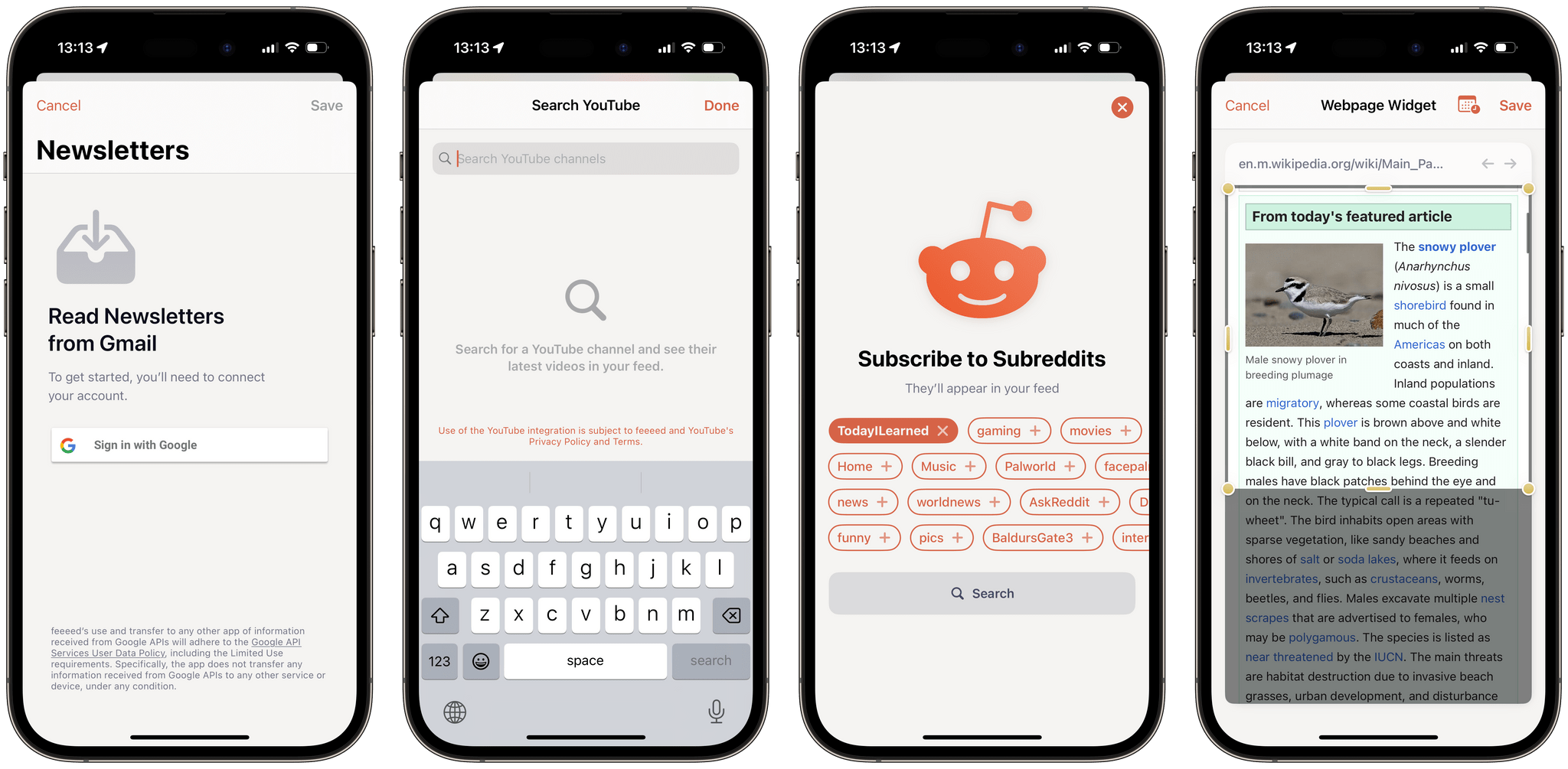
feeeed allows you to connect your Gmail account to read newsletters in the app. It lets you subscribe to YouTube channels, Subreddits, and even manually select an area on a website.
I have been using Reeder by Silvio Rizzi for my RSS needs for years. Honestly, I love the app: it’s beautiful and fast. But if there is one thing I don’t like about it, it’s how I’m constantly falling behind on my unread feeds. Parsing through hundreds of unread stories means spending a lot of time triaging inside the app. I often give up as a result, and mark everything as read, just so I can have some peace of mind.
Scrolling your feed, in…feeeed is awesome. I think Nate Parrott has done an amazing job mixing all those sources together. The main tab, Home, is not chronological, and contrary to other RSS reader apps, it doesn’t push you with read counts and marking stories as read or unread. Instead, it tries to balance recent updates with slightly older ones to give you a mix of fresh stories and stories you might have missed. Stories and updates are presented in cards. Cards can contain multiple stories at once, and they will feature a different look depending on the source. For example, they may include a “Comments” button for Reddit posts and large previews for YouTube videos.
If you’re done scrolling, you can always pull down to refresh, and feeeed will surface new cards every time. It feels a lot like curating your very own algorithmic social media timeline, this one being (mostly) free of ads and engagement bait.
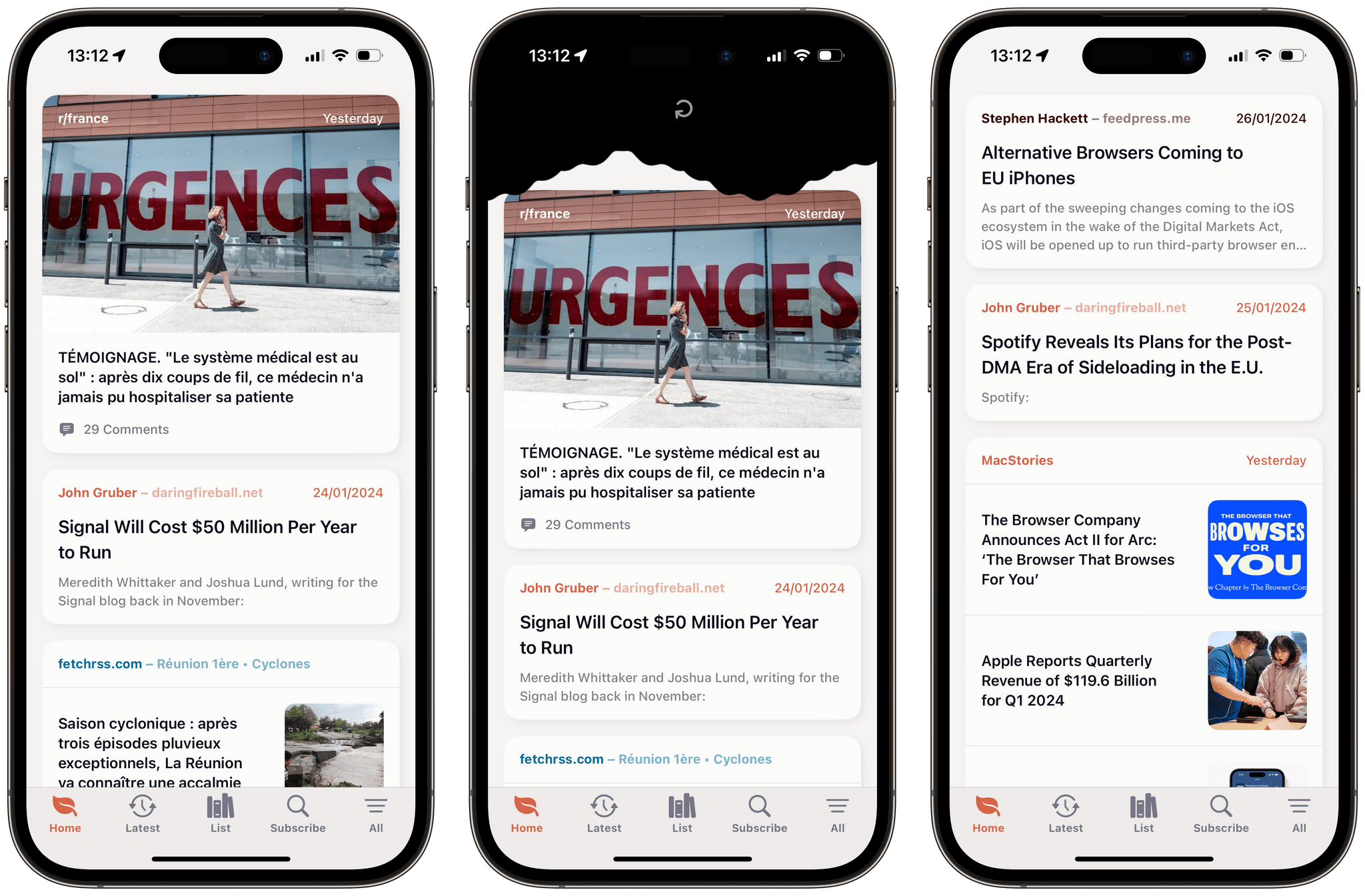
The Home tab features a mix of recent and older updates. Pulling down refreshes the tab with new cards
Not having the psychological burden of having to parse everything from my subscribed feeds to ensure I didn’t miss anything is amazing. Obviously, this app’s approach doesn’t guarantee that I won’t miss anything anymore, but it does mean that I’m not worrying about it as much as I did before.
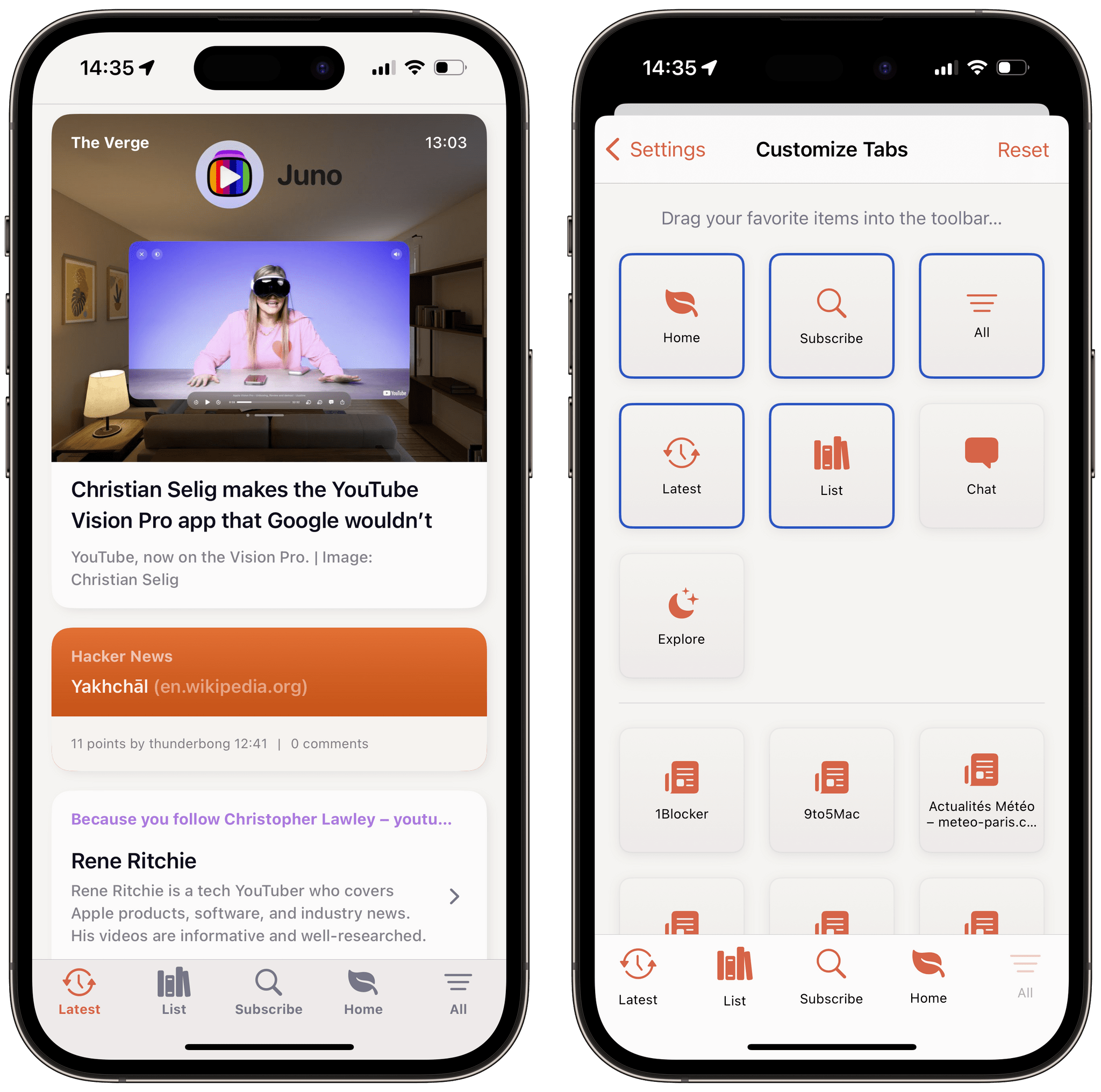
If you don’t like feeeed’s default Home tab, you can edit the toolbar and fully replace it with the chronological ‘Latest’ tab.
Reading a story in feeeed is exactly like you would expect. The app features a distraction-free reading mode, with an easy way to switch to the original web view if needed. The share sheet is also always just a tap away, with a dedicated button in the bottom right corner.
Anywhere in the feed, you can long-press a card and save it to your Reading List. Reading List items will show up in their own ‘List’ tab, but they will also appear in the main Home and Latest tabs. I’ve really been enjoying this small feature. I often tend to forget about articles I have saved for later, and feeeed has been pretty good at reminding me about that story I saved last week but still haven’t gotten around to reading.
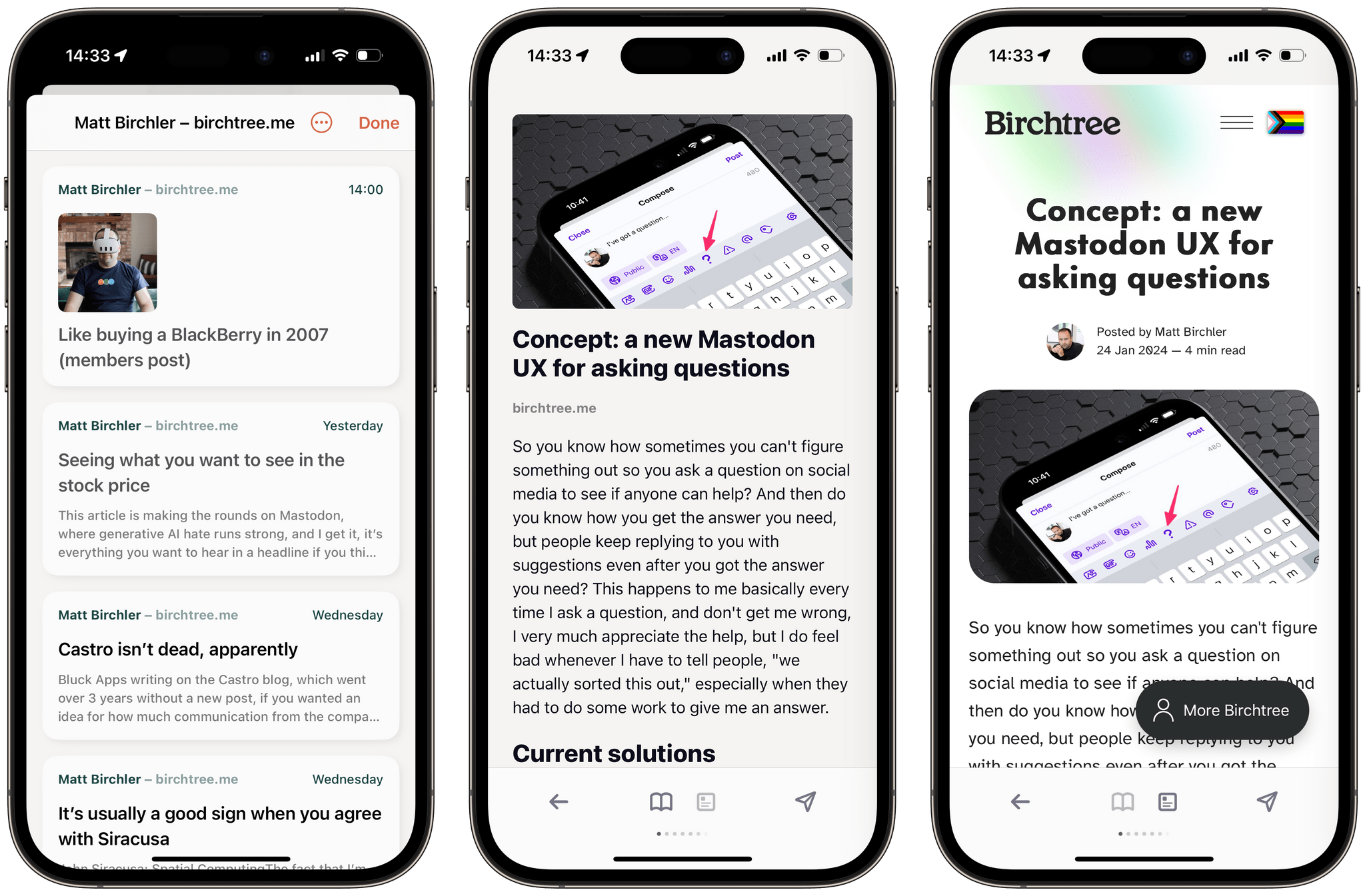
Browsing Matt Birchler’s blog in feeeed. Articles open in a distraction-free reading mode, and can be opened in their original web view.
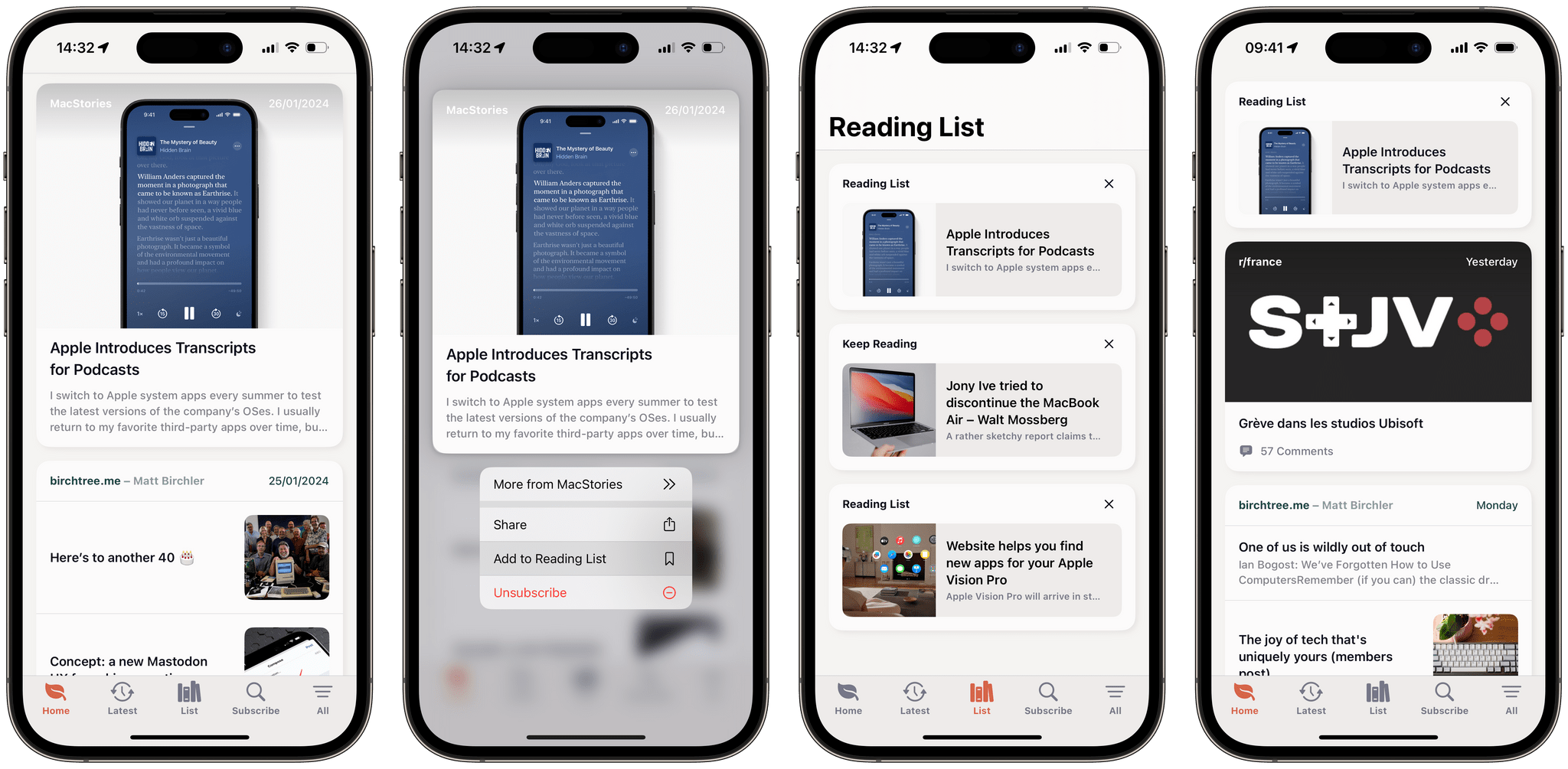
Long-press a card to add it to your Reading List. Reading List items show up in their own ‘List’ tab, and occasionally in the main ‘Home’ and ‘Latest’ tabs.
feeeed’s widget works in a similar way to the Home tab. Instead of just displaying recent items, it surfaces a mix of old and newer stories throughout the day along with Reading List items. I’ve found it ideal for StandBy mode at my desk, where I can glance at the widget and quickly jump into a story it recommended.
For a relatively new app, feeeed has a lot of settings. The tab bar can be entirely customized, but that’s not all. The app lets you switch from the ‘Cards’ view to a more compact ‘List’ view, and choose from a handful of tint colors and custom app icons. Most importantly, there are toggles that allow you to adjust the behavior of the feed, and decide whether follow suggestions and reading list reminders should appear or not.
Another way feeeed feels different from most other RSS readers is its emphasis on discovery and exploring new sources. feeeed has an Explore tab. The Explore tab is mostly filled with very popular publications, but as I browsed through the various thematic categories, I ended up following a few that I had never thought to subscribe to before.
The app also has in-feed follow recommendations, and overall, I’m quite impressed by them. feeeed regularly recommended YouTube channels to me based on those I had already followed in the app. Most of the time, those recommendations were spot on. Sure, they were always channels that I was already following on YouTube, but feeeed isn’t connected to my YouTube account, so it doesn’t know that.
Curation requires a lot of work, and Nate Parrott has clearly spent a lot of time ensuring that his curation doesn’t clash with your own sources. Recommendations remain optional and can all be turned off. Since I imported an OPML file with all the feeds I was already following in other apps, I didn’t feel the need for these features. But I can imagine them to be nice to have if you’re starting from scratch.
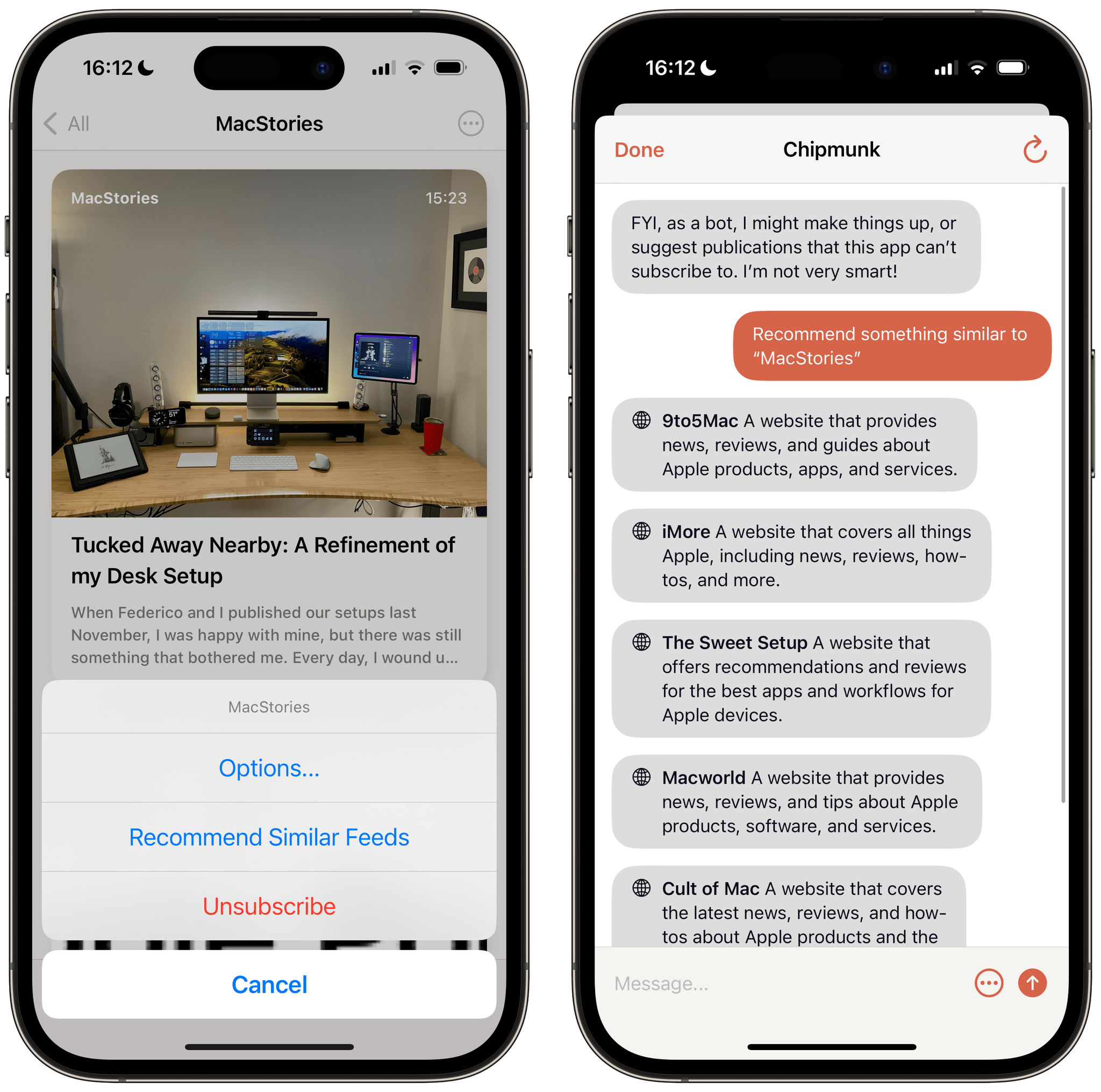
There is a small chatbot inside feeeed called Chipmunk. It is mainly used for recommending similar sources.
This is a certain theme in the air at the moment. The future of social media and online content consumption seems to be more and more centered around decentralized protocols and open standards, like ActivityPub and RSS. With this trend slowly but surely unfolding, an old app category may be morphing into an exciting new one. RSS clients and reading apps can evolve to allow anyone to curate their own timeline, made up of content from all corners of the web. Project Tapestry and feeeed are two different takes on this idea, and while the former is still in its conceptual phase and raising funds, the latter is already here and is working really well for me. And the exciting news is: even more iterations are on the way.
If you feel like giving feeeed — remember, four ‘e’s — a try today, the app is available for free on the App Store. feeeed is designed to work on iOS and iPadOS, and can run in iPad compatibility mode on macOS, although the developer says a native Mac app is in the works.


